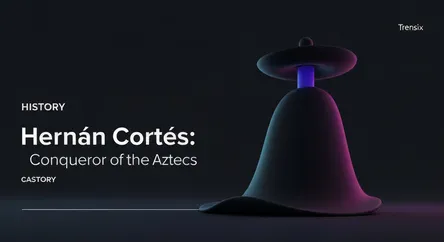History
Hernán Cortés: Conqueror of the Aztecs

An overview of Hernán Cortés, the Spanish conquistador who led the expedition that caused the fall of the Aztec Empire in the 16th century.
What is it?
Hernán Cortés was a Spanish conquistador who led the expedition that resulted in the collapse of the Aztec Empire. Born in Medellín, Spain, in 1485, he sailed to the New World seeking fortune. In 1519, he launched an expedition into mainland Mexico against orders. Aided by superior weaponry, tactical advantages, and crucial alliances with indigenous groups resentful of Aztec rule, Cortés and his men marched on the Aztec capital, Tenochtitlán. After a series of conflicts and a lengthy siege, the city fell in August 1521, paving the way for Spanish colonization of the Americas and the establishment of New Spain, which would later become Mexico.
Why is it trending?
Hernán Cortés remains a topic of interest due to his complex and controversial legacy. He is a pivotal figure in world history whose actions permanently altered the course of the Americas. Discussions around colonialism, cultural impact, and the ethics of conquest keep his story relevant. In places like Mexico and Spain, Cortés is a divisive figure, seen by some as a heroic explorer and by others as a ruthless conqueror. His legacy continues to be debated in academic circles and public discourse, especially in relation to modern-day cultural and racial dynamics in Latin America.
How does it affect people?
The actions of Hernán Cortés had a profound and lasting impact. For the indigenous peoples of Mexico, his conquest led to the destruction of their empire, immense loss of life from warfare and diseases like smallpox, and the suppression of their cultures and religions. It initiated centuries of Spanish colonial rule, creating a new social hierarchy that placed Europeans at the top. For Spain and Europe, the conquest brought immense wealth, sparked a wave of further colonization, and established a powerful overseas empire. Today, the legacy of Cortés influences Mexican national identity, politics, and the ongoing conversation about the consequences of European colonialism.